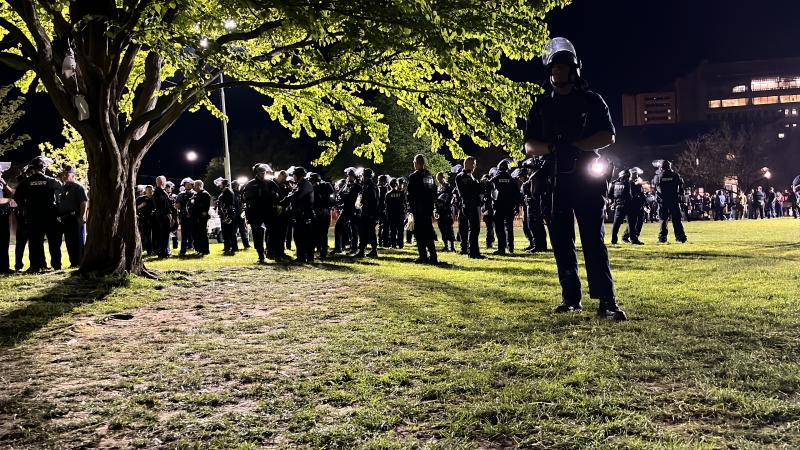UMass Paid $446K for Report Exonerating Chancellor in Police Assault on Student Encampment

Police preparing to move on the protesters at UMass, May 7, 2024. Photo: Leyla Moushabeck
The University of Massachusetts Amherst paid $445,938.89 to Boston law firm Prince Lobel to conduct an independent review of police actions on the UMass Campus on the evening of May 7, 2024 that resulted in the violent arrest of 134 peaceful activists who were protesting the US-Israeli genocide in Gaza. Several of those arrested sustained significant injuries. Some faced felony charges and/or two-year bans from the UMass campus. The Shoestring reported on police body cam footage documenting brutality (see also here for a witness account of the arrests).
The information about the cost of the review was requested by UMass Professor of History Kevin Young who was one of the people arrested on May 7. Young submitted a public records request for the information in March of 2025.
The Prince Lobel report acknowledged that the University might have taken a “more flexible and deliberative approach” to the protests but ultimately judged the actions taken by university leadership to be “reasonable” and “understandable” and the deployment of police to be justified.
The police intervention that day involved over 200 police officers including UMass Police, State Troopers (including the State Police Special Emergency Response Team (SERT)), Town of Amherst police, Town of Hadley police, and members of the Hampshire and Hampden County Sheriff’s offices. Witnesses counted 117 police vehicles marshalled prior to the intervention. That police intervention was estimated by The Shoestring to have cost Massachusetts taxpayers $100,000.
In the wake of the police action, which resulted in the dismantling of a peaceful encampment in support of Palestine, the undergraduate student body, the graduate employees’ union, and the faculty and librarians all issued votes of no-confidence in Chancellor Javier Reyes. The campus’s five biggest labor unions forcefully condemned the repression. The police action received national press coverage and was widely criticized as excessive and unjustified and was cited as the first ever police intervention on the UMass campus mobilized to silence political speech.
Reyes’ efforts to justify his order for police intervention subsequently led to his commisioning the Prince Lobel investigation.
In a scathing dissection of the Prince Lobel report following its release in January of 2025, Young decried the cherry picking of data that produced the findings. He said, “I was one of multiple witnesses who provided the Prince Lobel team with evidence that refutes the key aspects of the Reyes administration’s narrative. That evidence included the transcript of the May 14 meeting where Reyes and other leaders defended their actions. It also included sources containing hyperlinks to extensive supplementary evidence. The Prince Lobel team appears to have ignored that evidence almost entirely. The central conclusion they draw from their ‘findings’ is that Reyes’s deployment of the police was justified.“
“None of this should surprise. There’s no reason to expect that an investigation commissioned by UMass administrators and directed by a Republican ex-district attorney would conclude that UMass administrators were anything but reasonable in their actions. The report reflects Prince Lobel’s ’client-centric vision of providing excellent outcomes, service and value.“
“Even so, because UMass administrators will cast the Prince Lobel report as an authoritative source on the events of May 7, it is worth dissecting the report’s claims. It is riddled with logical contortions, self-contradictions, and omissions of crucial facts. This is particularly disappointing because the Prince Lobel team had been provided – by me and multiple other witnesses – with evidence that refutes the administration’s claims. They chose to ignore it. Instead they adhered to their ‘client-centric vision’ by endorsing most of the administration’s narrative.”
UMass Redacted Cost of the Report
UMass tried to prevent the cost of the Prince Lobel investigation from becoming public. Young filed an initial public records request for documents about the report on March 6, 2025 and received key documents in return but with the dollar amount paid to Prince Lobel redacted. UMass claimed that the amount paid to Prince Lobel was protected by attorney client privilege. Young filed an appeal of that redaction to the Massachusetts Supervisor of Records on April 2. Following that appeal the University indicated that it would provide the missing information.
Young received an email from Emily Gest, Associate Vice Chancellor for Media Relations, on May 6 with the following note, “I understand you are looking for the cost of the Prince Lobel report. It cost $445,938.89. The comprehensive scope of this review reflects the campus’ commitment to an honest, thorough, and fully independent evaluation of its actions. This process demonstrates our dedication to continual improvement and thoughtful reflection, as evidenced by the steps we’ve taken to initiate this review and implement meaningful changes across the campus.”
Young told the Indy, “UMass administrators painted the Prince Lobel investigation as an ‘independent review,’ but when I asked for basic details about that review, they invoked ‘attorney-client privilege.” So was this an ‘independent review’ or a service provided to a paying ‘client’? I don’t see how it can be both. Moreover, there is some irony in the UMass administration advertising the investigation as a step to ensure accountability for last year’s events while trying to ensure secrecy about the investigation itself.”
“This behavior reflects the administration’s penchant for secrecy, greatly amplified in this case by the Palestine Exception. Bureaucratic secrecy and repression of free speech are generally deemed acceptable, or even imperative, when directed against those who denounce the atrocities of the U.S. and Israel.”
“The UMass President’s Office made the process unnecessarily tedious. It shouldn’t take two months to obtain basic information about how UMass is spending the money of taxpayers and students. I shouldn’t have needed to request it at all, since it should’ve been publicly accessible.”
Read More about the Prince Lobel Report:
In Amherst Wire and The Shoestring
In the Amherst Indy
